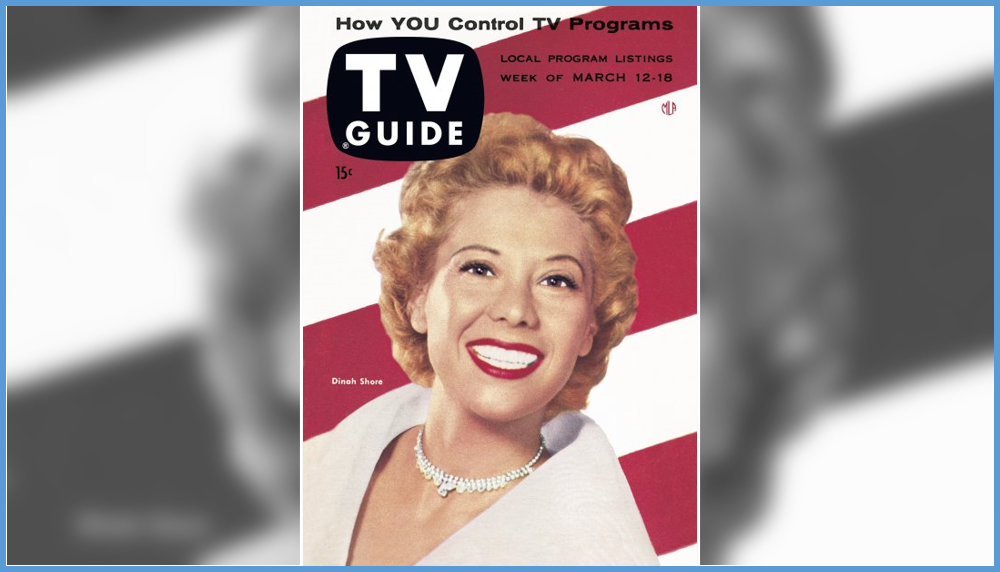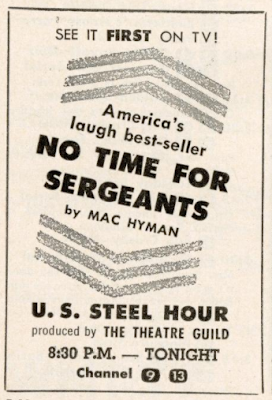As you know, Sunday has long been considered the graveyard of cultural programming, a time when the networks could prove their commitment to the edification of their viewing public by airing shows that appealed to our better nature. By airing such programming, the suits were able to accomplish two objectives:
- Satisfy the Federal Communications Commission that they were, in fact, fulfilling their obligations to serve the public interest, and thereby removing any obstacle to having their license renewed; and
- Stick low-rated programs in a timeslot where they couldn't damage the ratings for the rest of their shows.
I realize that this observation may strike you as somewhat cynical, but anyone who spends much time with the history of television learns to be that way. And this week we see that such an attitude dates all the way back to 1955, less than a decade into the history of American television.
At last count, according to the unbylined article, there were fifteen—count 'em, fifteen—such shows on Sundays, covering a wide variety of "thought-provoking" shows, from Hallmark Hall of Fame to Meet the Press to Zoo Parade.* The networks say, wide-eyed and sincerely, that it's because Sunday is "family day," but we know better, don't we? As the author points out, many of these programs are aired without sponsors, Sundays being replete with unsold ad time. "So rather than permit their local affiliate stations to fill the day with old movies, the networks are using it to carry out their public service commitments."
*I told you it was a wide variety.
 |
| Not that kind of culture! |
It's not just plays (Omnibus) and operas (NBC Opera Theatre) that we're talking about; besides news programs like Meet the Press, NBC has Youth Wants to Know, which "brings students and government officials face to face"; meanwhile, CBS offers Face the Nation, You Are There and The American Week, For those of an artistic bent, ABC has the art and literature program Key to the Ages, and Dr. Frank Baxter's literature program Now and Then airs on CBS. Zoo Parade, Marlin Perkins' precursor to Wild Kingdom, is an NBC perennial, Horizons, CBS explores the world of natural history with Adventure, and ABC's medical program, actually airs on Sunday night.
Throughout the 1960s, this kind of programming remains a staple of Sundays, from G-E College Bowl to Science All-Stars to Johns Hopkins Science Review. (Science programs were a big deal during the space race.) Today, Sundays are almost exclusively dedicated to sports, infomercials, and the odd syndicated program or reality series. Things have certainly changed, but even if we didn't watch the cultural fare being offered, can we honestly say that television is better off without it?
l l l
It isn't often that we get to look at a program that would become a defining moment in television history, but here we are. It's Tuesday night's United States Steel Hour broadcast of "No Time for Sergeants" (8:30 p.m. CT, ABC), written by Ira Levin, based on the novel by Mac Hyman. And the significance lies in its star, Andy Griffith.
Griffith is far from an unknown at this point; his comedy monologue "What it Was, Was Football" had gone to #1 just the previous year, back in the days when comedy records were big stuff, and Griffith had done the routine on Ed Sullivan's Toast of the Town show. He didn't, however, have a reputation as an actor, until he was cast as airman Will Stockdale, a bumpkin who drives his commanding officer, Sergeant King, crazy
The broadcast is a smash, and Griffith becomes synonymous with the role. As was frequently the case in the early days of television, the script is expanded and turned into first a Broadway play and then a big-screen movie, both of which star Griffith.* He garners a Tony nomination for the play, and by the time he does the movie version in 1958, he's coming off an unforgettable performance in A Face in the Crowd. Fast forward to 1960, when he appears in an episode of Make Room for Daddy as the sheriff of a small southern town who nabs Danny Thomas for driving through a stop sign.
*Also appearing in the Broadway and film productions: Don Knotts, starting a lifelong relationship with Griffith.
The name of Griffith's character in that episode is Andy Taylor. And you don't need Paul Harvey to know the rest of that story.
l l l
We've read about Max Liebman's monthly Saturday night color spectaculars on NBC, and this month's is certainly spectacular enough: the musical comedy "A Connecticut Yankee" (8:00 p.m.), written by Richard Rodgers and Lorenz Hart and based on the Mark Twain story, with Eddie Albert, Janet Blair, and Gale Sherwood, and an appearance by Boris Karloff as King Arthur.
You may remember a few weeks ago our discussion about ice shows on TV. (After all, we have nothing better to do.) Well, we're back at it this Sunday, as Ed Sullivan takes Toast of the Town on the road to the great Chicago Stadium for a performance by the Ice Capades and its star, Donna Atwood. (7:00 p.m., CBS) Accompanying Ed is Dublin's Irish Festival Singers, Victor Borge, Teresa Brewer, juggler Rudy Horn, and child acrobats Vernon & Bumpy. Meanwhile, over at NBC, it's Sullivan's great rival, The Colgate Comedy Hour, with Abbott and Costello making their first hosting appearance of the season, welcoming guests Gordon MacRae, Debra Paget, and Bobo Olson, the world middleweight boxing champion. Not to turn this into a Sullivan vs. The Palace, but which show do you favor?
Here's something you don't often have: a soap opera changing its name without changing the cast or the premise. Portia Faces Life began (as so many soap operas did) on radio, in this case in 1940, and shuttled between CBS and NBC until 1953; the following year it made the move to television, debuting on CBS in April of 1954. Monday sees it come back from the weekend break as The Inner Flame (noon, CBS), while keeping everything else the same. It doesn't do much good; the show will go offer the air on July 1. I wonder what the motive was for the name change? Perhaps they were afraid it sounded too much like a sitcom, like My Little Margie, rather than a soap opera? When primetime comes around, don't miss the famous gossip columnist Hedda Hopper guesting on I Love Lucy (8:00 p.m., CBS)
Tuesday's highlight comes after primetime on Tonight (11:00 p.m., NBC), as Steve Allen honors the famous photographer Edward Steichen, who curated the landmark photographic exhibition "The Family of Man" at the Museum of Modern Art in New York. (Steichen, one of the most influential photographers of the 20th Century, is, according to the always-reliable Wikipedia, credited with "transforming photography into an art form"; the great Stieglitz called him "the greatest photographer that ever lived."
Big doings on Wednesday's episode of Howdy Doody (4:30 p.m., NBC): the mysterious "Mr. Nick" turns out to be the mayor of Clarabell the Clown's hometown of Clowntown.* Behind the scenes, Lou Anderson takes over the role of Clarabell from Bob Nicholson, who is now playing Mr. Nick. (I wonder what that was all about?) Anderson is the third and final actor to play the famous mute clown; the originator of the role, as many of you will probably know, was Bob Keeshan.
*I didn't know Clarabell was from Washington, D.C., did you?
It's a rare color broadcast on CBS Thursday night, as Shower of Stars (7:30 p.m.) presents a musical version of the Broadway hit "Burlesque," starring Dan Dailey, Marilyn Maxwell, Joan Blondell, Jack Oakie and James Gleason. All that in just an hour. The second half of Shower has to contend with Dragnet (8:00 p.m., NBC), as Friday and Smith contend with an uncooperative husband whose wife has been kidnapped. My bet is that they'll talk him into letting them investigate the case—unless, of course, he knows what happened to her. . . (I've seen the episode, but I'm not telling.)
Schlitz Playhouse of Stars (Friday, 8:00 p.m., CBS) may have a similar title to Shower of Stars but quite a different kind of story; John Ireland stars as "a fast man with a gun who likes to right wrongs without troubling with legal processes" in "Ride to the West." Sounds like my kind of guy, doesn't he? Later on CBS, Ed Murrow's Person to Person (9:30 p.m.) spends the half-hour with hotel magnate Conrad Hilton and comedian Red Buttons.
l l l
 |
| Not related |
l l l
In October, 1956, she'll graduate to a full-hour variety show (The Dinah Shore Chevy Show), which remains on the air until 1963. One of the more famous cultural touchstones of this time is the Chevy theme song, which Dinah would sing in every episode. ("See the U.S.A./in your Chevrolet.") Dinah wasn't the first celebrity to sing that jingle, though; it originated with Peter Lind Hayes and Mary Healy, who were hosting a show called Inside U.S.A. With Chevrolet (which is an interesting story in and of itself, perhaps for another day). By 1952, though, our girl Dinah was belting it out, as she would for another decade. If they hadn't composed that, though, they could always have used one of Dinah's own hits: "Nothing could be finer/than to drive around with Dinah/in your Chev-ro-let." Or maybe not. TV








No comments
Post a Comment
Thanks for writing! Drive safely!